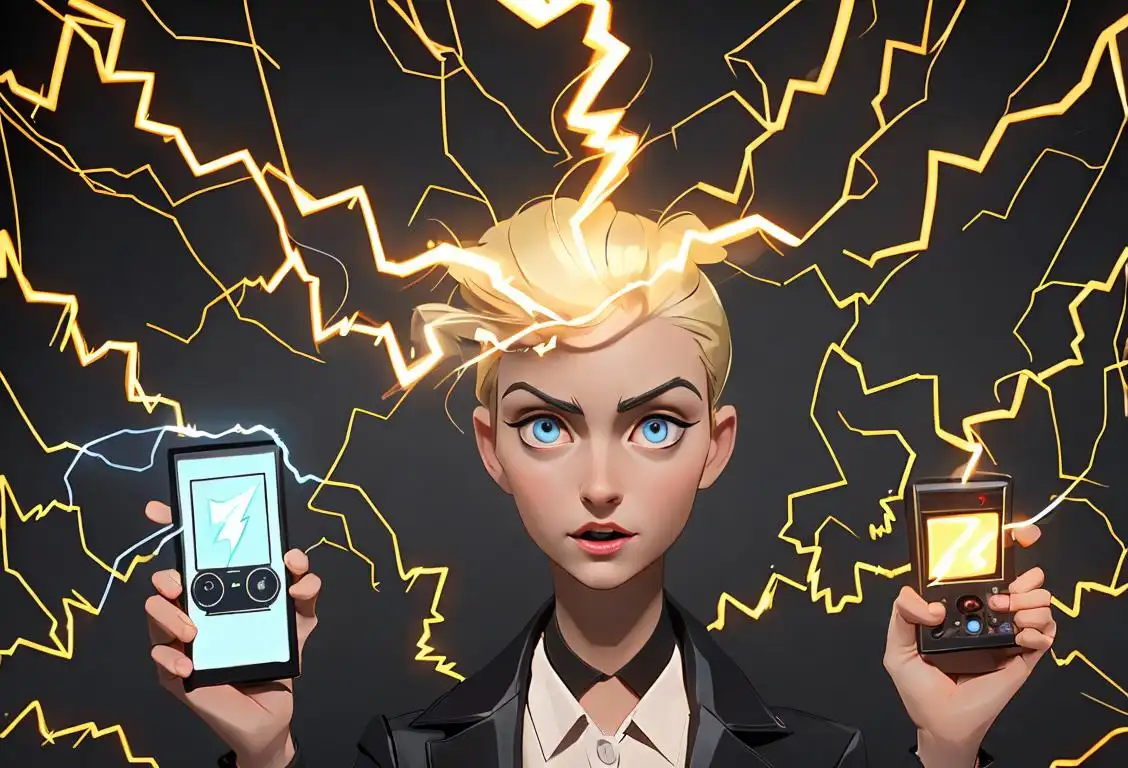National Electricity Day

Welcome to National Electricity Day, the sparkliest day of the year! Get ready to light up your life with a jolt of electric knowledge and celebrate the wonders of electricity. From the humble light bulb to the powerful electric grid that keeps our homes buzzing, this day honors the incredible invention that revolutionized our world. So grab your favorite gadget, charge up your enthusiasm, and let's dive into the illuminating history of National Electricity Day!
When is Electricity Day?
It's national electricity day on the 15th June.
Power Up Your Knowledge
When we think of electricity, the first name that pops in our heads is undoubtedly Thomas Edison. Ah, good ol' Tom! He's the man behind the incandescent light bulb and a slew of other inventions that brightened up our lives. But did you know that electricity has a history that goes way beyond our buddy Edison?
Before Edison, it was an electrifying rivalry between Nikolai Tesla and Edison that powered progress. Tesla, the brilliant inventor of alternating current (AC), and Edison, the champion of direct current (DC), battled it out to prove their electrical prowess. Eventually, AC won the electrifying war and became the dominant form of electricity we use today. And thank goodness, because otherwise, we'd all be stuck with a bunch of disfigured alien babies floating in mason jars. Yikes!
Nowadays, electricity is all around us. It's in our homes, schools, offices, and even our pockets. We rely on it for everything, from charging our phones (a fate worse than death if we're honest) to binge-watching our favorite shows on neon-lit screens. So take a moment to appreciate the pure magic that flows through those power lines and brings us the joy of fully charged devices.
Shocking Fun Fact
Did you know that when you touch a doorknob, you're not the only one getting shocked? It's true! The doorknob is also getting a tiny jolt of electricity from you. Think of it as a friendly high-five between you and the door. So next time you feel a little spark, remember that you and that doorknob have just shared a brief moment of electrifying connection. Talk about a shocking way to make friends!
History behind the term 'Electricity'
1600
Early Discovery
In the year 1600, English scientist William Gilbert coined the term 'electricity' to describe the force that certain materials possess to attract or repel other objects. He derived this term from the Latin word 'electricus,' meaning 'like amber.' Gilbert noticed that when amber was rubbed with a cloth, it attracted lightweight objects like feathers or bits of paper. This discovery marked the beginning of the understanding and exploration of electricity as a phenomenon.
1752
Benjamin Franklin's Experiment
In the year 1752, American polymath Benjamin Franklin conducted his famous kite experiment to study the nature of lightning and its relation to electricity. Although the term 'electricity' had already been in use for over a century, Franklin's experiment played a crucial role in solidifying the connection between lightning and electrical energy. By flying a kite with a metal key attached during a thunderstorm, Franklin validated the theory that lightning is a form of electrical discharge.
1800
Volta's Invention of the Battery
In the year 1800, Italian physicist Alessandro Volta invented the 'voltaic pile,' which we now refer to as the battery. Volta's creation revolutionized the understanding and practical application of electricity. By stacking alternating layers of zinc and copper with cardboard soaked in brine, Volta created a device that could generate a steady flow of electrical current. The discovery of the battery not only advanced scientific experiments but also led to the development of countless electrical devices and technologies.
1827
Ohm's Law
In the year 1827, German physicist Georg Simon Ohm formulated Ohm's Law, a fundamental principle that describes the relationship between voltage, current, and resistance in an electrical circuit. Ohm's Law, denoted as V = I * R, provided a quantitative understanding of how electricity behaves. This breakthrough contributed greatly to the field of electrical engineering and paved the way for further innovations in electric power transmission and distribution.
1879
Edison's Incandescent Light Bulb
In the year 1879, American inventor Thomas Edison successfully developed and patented the first practical incandescent electric light bulb. Edison's invention marked a significant milestone in the history of electricity, as it provided a safe and reliable source of artificial light for everyday use. The widespread adoption of incandescent bulbs led to the rapid electrification of homes and cities, transforming the way people lived and worked.
1882
Launch of the First Electrical Power Station
In the year 1882, the Edison Electric Illuminating Company of New York launched the first commercial electrical power station in the United States. Located in Manhattan, the Pearl Street Station generated electricity using steam-powered dynamos and distributed it to customers in the surrounding area. This event marked the birth of the modern electric power industry, paving the way for the widespread use of electricity in various applications, from lighting streets to powering factories.
Did you know?
When you touch a doorknob, you're not the only one getting shocked. The doorknob also gets a tiny jolt of electricity from you!Tagged
fun history technologyFirst identified
25th October 2015Most mentioned on
15th June 2020Total mentions
92Other days
Radio The Day
Video Games Day
Electricity Day
Tunnel Day
Aviation Aviation Day
Technology Day
Convention Day
Liberation Day
Teacher Appreciation Day
Memorial Day








